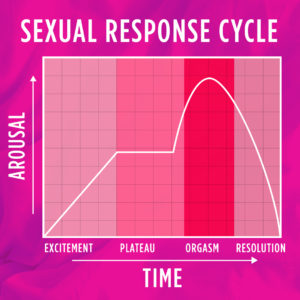Touch Me, Tease Me: A Guide to the Sexual Response Cycle
When you think of sex, what comes to mind first?
Is it the thought of being stimulated and aroused by a variety of activities like kissing, sucking, licking? Or do you think about penetration and orgasms?
Regardless of what you think about first, did you know that all of these types of activities are phases of the sexual response cycle? Our sexual response cycle is the progression of physical and emotional changes that happens when we are sexually aroused and engaged in activities that are sexually stimulating. The sexual response cycle, developed by Masters and Johnson, is a four-phase model to describe these changes during sexual stimulation.

Sexual stimulation often begins with desire, or interest in sexual activity. A person’s desire can be heightened by our hormones, words and gestures by our partners, and even by our senses. Yes, you guessed it, this includes the things we see, smell, hear, touch, or taste. According to the sexual response model, sexual desire is not required, but it can definitely add to the experience.
Four Phases of the Sexual Response Cycle:
Arousal (or excitement) – The first phase in which physical or mental activities lead to sexual arousal. Activities in this phase can include but are not limited to kissing, touching, oral and anal play. In this phase, the heart rate increases, genitalia become hardened or erect (nipples, clitoris, penis), and vaginal walls begin to lubricate.
Plateau – In this phase, sexual arousal increases as well as sexual pleasure. Signs of this phase include rapid heart rate and a variation of shorter breaths or deep, long breaths. In this phase, a penis may release fluid (pre-ejaculatory or pre-cum) and the clitoris may become extremely sensitive.
Orgasm – This phase is the end of the plateau phase and often symbolized by quick muscle contractions or spasms that are involuntary. This phase is commonly associated with ejaculation (cum) from a penis. The orgasmic phase is also associated with increased vaginal lubrication. The sensation is described as intense sexual pleasure, however each orgasm may vary in the ways in which it is achieved (or experienced).
Resolution – In this phase, the body recovers sexual stimulation. The muscles begin to relax, blood pressure goes down, heart rate is restored, and breathing returns to its typical pattern. This phase is also the time the body needs before starting the cycle all over again. This period of time, also called the refractory period, can be shorter for women (or persons with a vagina) than for men (or persons with a penis).
Okay, so based on this information, here are some things to consider:
Many of us have heard several ideas about how sex should go, whether is the baseball analogy of “first base, second base, third base, homerun” or this idea that sex follow a script of foreplay then sex, then orgasm. Consider rethinking the idea that sexual experiences end with experiencing an orgasm. This way of thinking can limit sexual pleasure, especially because not all sexual activities – pleasurable, sexual experiences – will lead to an orgasmic experience.
According to the sexual response cycle, excitement and resolution are the longest phases, lasting minutes to hours. Orgasm is the shortest, lasting only a few seconds. This drives home the point that sexual stimulation during the arousal/excitement phase is actually one of the more important (and longest) phases of the cycle. Consider taking your time to enjoy the experiences and activities that are occurring. This can be a time of sexual exploration and liberation, a time to spice things up, or simply to slow things down. Don’t rush through it, enjoy it!
Lastly, keep in mind that women (or persons with genitalia including a vagina and clitoris) can experience multiple orgasms with little to no “down” time. Sexual stimulation can start over quickly, however, this is not a one-size-fits-all idea. Sometimes further stimulation does not lead to excitement, and in this instance, intimacy or rest may be the next best option.
If you would like to learn more about orgasms, take a look at these articles, Orgasm Gap and Outrageous Orgasm. Need a sexual liberating playlist?
Which Product Matches Your Zodiac Sign
Ashley Townes
PhD, MPH, Sexual Health ResearcherDr. Townes has experience working as a Community Health Educator and Disease Intervention Specialist in Cincinnati and the surrounding areas. She has worked on several initiatives related to the dissemination of national HIV prevention and care campaign materials tailored for African Americans, Hispanic/Latinx, and transgender women of color. Dr. Townes has taught collegiate-level Human Sexuality courses, served as an Epidemiologist at the Ohio Department of Health, and currently works as a sexual health researcher in Atlanta, GA.
Ashley’s research background includes work on the sexual experiences of African American/Black women accessing health information and utilizing sexual health services. In 2018, she received grant funding from the Patty Brisben Foundation for Women’s Sexual Health to translate sexual health research data into educational materials. Her career interests are aimed at providing quality sexual education and working towards health equity.









